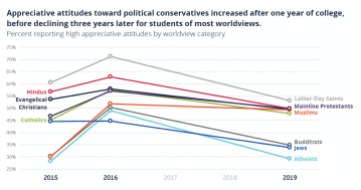In America, a Jesuit magazine, a recent college graduate reflects on how his years at a religious university changed him.
By his own account, Elisha Valladares-Cormier arrived at college as a conservative Catholic culture warrior. And his school, Franciscan University of Steubenville, has a reputation among American Catholics as a very conservative institution. He entered college during the 2016 election, a divisive moment for U.S. Catholics.
Looking back, he writes:
The skeletons in my closet pop up when I least expect them to. I am reminded of them when Facebook tells me that five years ago, I shared a meme from a conservative page essentially using the Boston Marathon bombers’ refugee status as a rationale for stopping all refugees from entering the country. Other links I shared include headlines beginning with ‘Liberals Lose Their MINDS When…’ followed by examples of what today would be referred to as ‘Karen’-type behavior.
I am only 22, but I cannot pin exactly what led me to share these posts, full of exaggeration, hyperbole and more. I was at that know-it-all age most teenagers land in, where the best argument is a ‘gotcha’ one. But looking back, what frustrates me the most is the intellectual dishonesty of some of these posts.
What was I thinking? Perhaps I should be asking, why wasn’t I thinking? These were complex issues, but the world around me had taught me to view these issues through binary, partisan lenses. …
I did not come out of Franciscan University less conservative or more liberal, or vice versa. Instead, I was pushed to consider new perspectives, to question positions I previously held, to take a Christocentric view of the world even though I might not feel at home with any major party.
—Elisha Valladares-Cormier, “I started school at Steubenville as a conservative culture warrior—and came out the other side more Catholic”
Experience tells me that we shouldn’t assume any new college graduate’s current views will remain static. As a thoughtful person with a university education, Valladares-Cormier is likely to continue evolving in unpredictable ways. This may well lead him to new forms of partisanship, to a fundamental change in political or religious views, or perhaps to complete disillusionment with the position he now holds. (Then again, he may turn out to have changed very little thirty years from now.)
What I think is useful about this essay is that it presents us with a snapshot of a young student who recently has experienced a higher education as transformative—and intellectually liberating and generous—in unexpected ways.
Versions of this story (mutatis mutandis) are very common among university students and graduates who came to college anticipating, or trying to engineer, a specific intellectual outcome. You’ll hear stories like this from students at all kinds of universities and colleges, including schools with reputations for producing belligerent partisans and culture warriors.
This is what gets lost in much of the storm and stress of American political debates about higher education. In all the nonsense about students’ supposed brainwashing and indoctrination* at the hands of professors, we rarely hear about the downright ubiquitous experiences of students—of all kinds—for whom college, sometimes in unexpected ways, lives up to its mission of intellectual liberation.
_______________
* Ironically, of course, in this case, indoctrination would be a quite literally correct description of what Valladeres-Cormier says he sought and received from his Catholic professors. It just turned out not to mean what he expected.
Image: Steubenville, Ohio, 2007. Photograph by Mike Sharp via Wikimedia Commons. Used under CC BY-SA 4.0.






